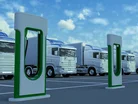EO Charging Launches EO Hub to Power EV Fleets

EO Charging has announced the launch of energy management system EO Hub, which automates load management for all AC and DC charging stations, inside a single depot.
EO Charging is a specialist in full fleet electrification solutions for depot-based fleets, based in London. EO Hub helps fleet operators reduce charging costs by optimising grid connections and has already been installed by bpost.
EO Hub lowers the cost of ownership for Electric Vehicle fleets
EO Hub is designed to support the management of energy consumption, helping fleets to maximise the use of off-peak energy tariffs.
Key features of the EO Hub include the ability to calculate the real-time availability of power at a site and intelligently distribute to vehicles actively charging, as well as the option to work without internet connectivity. EO Hub reduces EV fleet total cost of ownership by avoiding demand-charges and smoothing out the consumption throughout the charging period. It is compatible with all OCCP AC & DC chargers and works with all AC and DC charging stations, inside a single depot.
EO Hub's role in empowering electric fleets and achieving net zero emissions at bpost
Charlie Jardine, CEO of EO Charging, understands that as EV fleets mature, energy management strategies, such as scheduling vehicle charging during off-peak hours, will become increasingly important.
“This is something the EV sector needs to address, so we've spent considerable time developing EO Hub, which enables on-site power use and bypasses the need for expensive and labour-intensive grid upgrades,” says Jardine. “Many fleet operators are looking to transition their fleets to electric, and this is where solutions like EO Hub play a crucial role in helping them make that transition by mitigating the need to upgrade the grid connection whilst reducing ongoing energy costs through smart charging."
bpost aims to reach a Net Zero emission fleet by 2030. Els Renders, Program Manager Electrification at bpost, understands that the transition to electric vans is a critical element to achieving this goal.
“EO Hub will align energy sources on-site with the energy requirements of our electric vehicles and will give us greater visibility and control over our energy consumption. This will help us reduce our fleet total cost of ownership (TCO) and manage our energy spend in the long term,” he says.
*******************
Make sure you check out the latest edition of EV Magazine and also sign up to our global conference series - Sustainability LIVE 2024.
*******************
EV is a BizClik brand.

